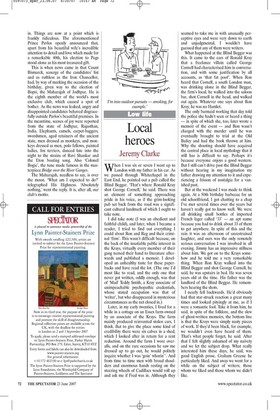Local heroes
Jeremy Clarke When I was six or seven I went up to London with my father in his car. As we passed through Whitechapel in the East End, he pointed out a pub called the Blind Beggar. 'That's where Ronald Kray shot George Cornell,' he said. There was an element of something approaching pride in his voice, as if the grim-looking pub set back from the road was a significant cultural landmark of which I ought to take note.
I did take note (I was an obedient and faithful child), and later, when I became a reader, I tried to find out everything I could about Ron and Reg and their criminal 'firm'. This wasn't difficult because, on the back of the insatiable public interest in the Krays, virtually every member of their gang turned their hand to literature afterwards and published a memoir. I developed an unhealthy taste for these paperbacks and have read the lot. (The one I'd most like to read, and the only one that never got written, oddly enough, was that of 'Mad' Teddy Smith, a Kray associate of unimpeachable psychopathic credentials, whose stated occupation was that of 'writer', but who disappeared in mysterious circumstances as the net closed in.) Later, in my early twenties, I lived for a while in a cottage on an Essex farm owned by an associate of the Krays. The farm mainly produced reinvented stolen cars, I think. But to give the place some kind of credibility there were six calves in a shed, which I looked after in return for a rent reduction. Around the farm I wore overalls, and on the rare occasions he saw me dressed up to go out, he would politely inquire whether I was `goin' whorin". And from time to time men with broad shoulders and enormous hands resting on the steering wheels of Cadillacs would roll up and ask me if Fred was in. Although they seemed to take me in with unusually perceptive eyes and were very down to earth and unjudgmental, I wouldn't have guessed that any of them were writers.
What happened at the Blind Beggar was this. It came to the ears of Ronald Kray that a freelance villain called George Cornell had characterised him in conversation, and with some justification by all accounts, as 'that fat poof'. When Ron heard that Cornell, a south London man, was drinking alone in the Blind Beggar, the firm's local, he walked into the saloon bar, shot Cornell in the head, and walked out again. Whatever one says about Ron Kray, he was no Hamlet.
The only barmaid working that day told the police she hadn't seen or heard a thing — in spite of which she, too, later wrote a memoir of the event — and Ron wasn't charged with the murder until he was eventually brought to trial at the Old Bailey and had the book thrown at him Why the shooting should have acquired the central place in local mythology that it still has is difficult to say. Perhaps it's because everyone enjoys a good western. But I still can't drive past the Blind Beggar without hearing in my imagination my father drawing my attention to it and experiencing a frisson of nostalgia for a vanished past.
But at the weekend I was made to think again. At a 50th birthday barbecue for an old schoolfriend, I got chatting to a chap I've met several times over the years but haven't really got to know well. We were all drinking small bottles of imported French lager called '33' — an apt name because you had to drink about 33 of them to get anywhere. In spite of this and the rain it was an afternoon of unrestrained laughter, and ours was the only remotely serious conversation I was involved in all evening Jimmy has an impressive stillness about him We got on to the Krays somehow and he told me a very remarkable thing. When Ron Kray walked into the Blind Beggar and shot George Cornell, he said, he was upstairs in bed. He was seven years old at the time. His father was the landlord of the Blind Beggar. He remembers hearing the shots.
I nearly fell backwards. He'd obviously had that star-struck reaction a great many times and looked pityingly at me, as if I were a romantic fool. Take it from him, he said, in spite of the folklore, and the slew of ghost-written memoirs, the bottom line is that the Krays were simply nasty pieces of work. If they'd been black, for example, we wouldn't even have heard of them. That's what people forget, he said. After that I felt slightly ashamed of my naivety and we let the subject drop. What really interested him these days, he said, was good English prose. Graham Greene he particularly liked. And away we went for a while on the subject of writers; those whom we liked and those whom we didn't like.





























































 Previous page
Previous page